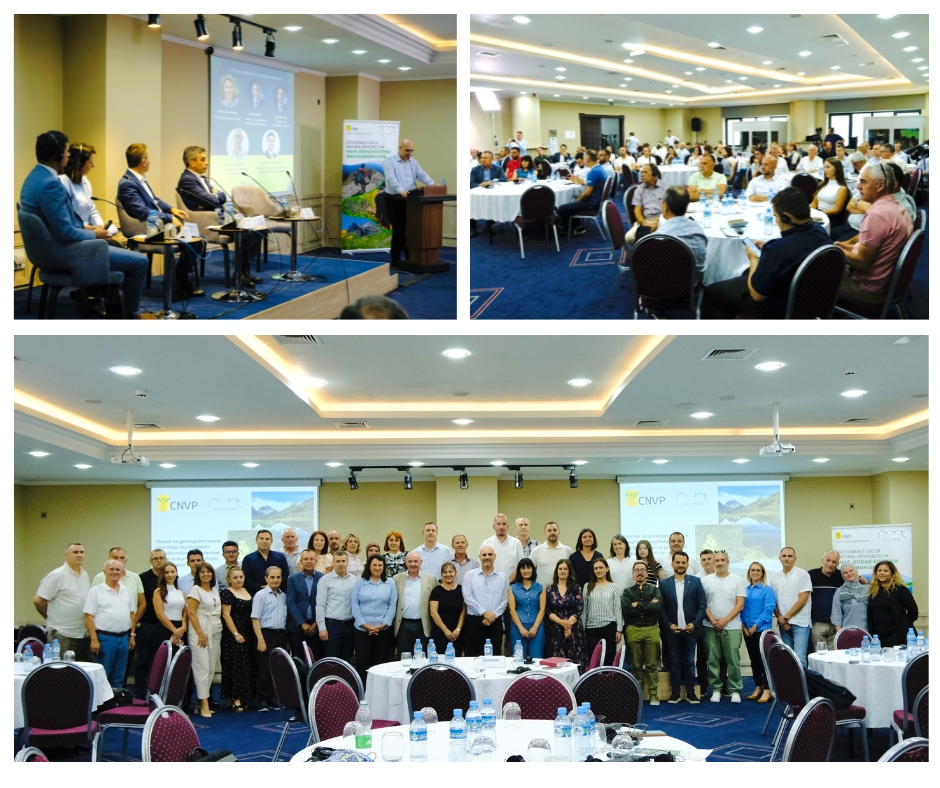News
Forum on Good Governance and Inter-Institutional Cooperation in Protected Areas

On June 18, 2025, the forum titled “Good Governance and Inter-Institutional Cooperation in Protected Areas of North Macedonia, Albania, and Kosovo” was held in Tetovo. The event was organized by CNVP North Macedonia as part of the project “Sustainable Use of Natural Resources in Korab-Koritnik, Shar, and the Albanian Alps,” financially supported by PONT (Prespa Ohrid Nature Trust).
The forum brought together around 100 participants from across the country and the region, including the Minister of Environment and Spatial Planning of North Macedonia, national park directors, mayors, representatives of state institutions, academia, experts and civil society representatives from North Macedonia, Albania and Kosovo, the donor PONT as well as other relevant stakeholders. The primary objective of the forum was to foster cooperation among national parks, local governments, regional public offices and institutions, with a focus on enhancing environmental conditions and promoting good governance in protected areas.
The forum was officially opened with welcome remarks from:
- Mr. Nehat Ramadani, Director of CNVP North Macedonia
- Mr. Izet Mexhiti, Minister of Environment and Spatial Planning of North Macedonia
- Ms. Mirjam de Koning, Executive Director of PONT
- Mr. Bilall Kasami, Mayor of Tetovo
- Mr. Matthias Humenberger, Deputy Ambassador of the Austrian Embassy in North Macedonia
In his opening remarks, Mr. Nehat Ramadani, Director of CNVP North Macedonia, emphasized:
“As we confront biodiversity loss, climate change, and environmental degradation, it is clear that no single institution or sector can tackle these issues alone. Collaboration is no longer just desirable—it is essential.
Environmental challenges are complex and deeply interconnected. They transcend national borders, professional disciplines, and institutional boundaries. To address them effectively, we must engage governments, academic institutions, the private sector, civil society, and international partners in a united effort.
Ms. Mirjam de Koning, Executive Director of PONT, also addressed the audience, stating:
In accordance with the IUCN Matrix we can distinguish four governance types for protected areas i.e. governance by government, shared governance, private governance, and governance by local communities. In this region the protected areas are governed by the government. As human and financial resources are limited and the effective management of protected areas need many different skillsets to for example adhere to the Birds and Habitats Directives, PONT encourages that certain tasks are delegated to or implemented in cooperation with academia and Civil Society Organizations. As vast areas need to be covered to manage wildlife, fires, tourists, etc. the involvement and contribution by local communities is essential to come to good solutions. Functioning stakeholder and science councils in North Macedonia and the park management committees in Albania are very important.
As part of the forum, two panel discussions were held:
- “Challenges of Good Governance and Inter-Institutional Cooperation in Protected Areas – The Case of North Macedonia”, Participants discussed the current state of protected area management in the Western Balkans, major challenges, and provided recommendations for reforms and improvements.
- “Practical Solutions and Best Practices in Inter-Institutional Cooperation from Abroad”
Successful examples and best practices from national parks outside the region were presented, with the potential for adaptation and implementation in the local context.
The event concluded with closing remarks by Mr. Nehat Ramadani, Director of CNVP North Macedonia.
Key Conclusions and Recommendations:
The forum outlined several important conclusions including:
- Collaboration Enhances Conservation Outcomes
- Shared expertise and resources allow for more effective management and enforcement.
- Biodiversity conservation improves when institutions coordinate monitoring, planning, and intervention efforts.
- Clear Roles and Responsibilities Are Essential; Ambiguity in mandates often leads to conflict, duplication of effort, or inaction.
- Community Involvement Is Crucial; Inclusion of local communities and indigenous groups enhances social legitimacy and compliance with conservation rules.
- Collaboration with community institutions brings in traditional ecological knowledge.
Key recommendations included:
- Developing shared visions with local stakeholders
- Supporting nature-based tourism and NTFP
- Promoting positive coexistence between local communities and nature
- Supporting sustainable development of villages within protected areas
- Ensuring effective nature conservation through collaboration and active engagement of all stakeholders
- Reducing political influence in the management of protected areas is essential
The project "Sustainable Use of Natural Resources in Shara, Korab-Koritnik, and the Albanian Alps" is implemented with financial support from the Prespa Ohrid Nature Trust (PONT), provided by the German government through the people of Germany.
